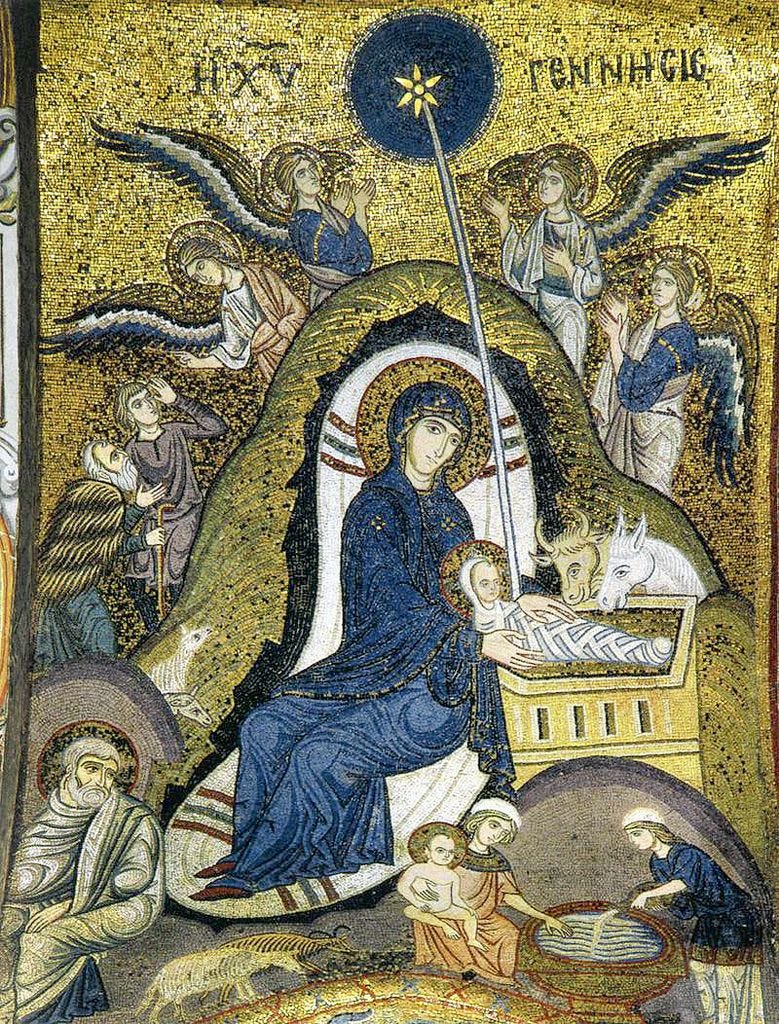In the Orthodox Church on the day after Christmas, we are instructed to gather our minds in contemplation of Our Most-Holy Lady the Mother God and Ever-Virgin Mary. Which is salutary for us at Life Sentences. At the end of the last episode we contemplated Eve as the icon of theoria at its most benighted. Today we contemplate the New Eve, the icon of theoria at its most exalted.
This connection between the two Eves, the two ‘mothers of all living things’, was acknowledged as early as the second century AD, when St Irenaeus wrote this in Against Heresies, book iii, chapter 22:
The knot of Eve’s disobedience was loosed by the obedience of Mary, for what the virgin Eve had bound fast through unbelief, this did the virgin Mary set free through faith.
The first Eve: disobedience and unbelief: the contemplation that is not in accordance with nature rendering opaque all that we perceive with our senses. The second Eve: obedience and faith: the natural contemplation that arises out of the purified heart transforming the sense-perceptible world into translucent glass revealing the unseen.
You’ll recall what Evagrius told us, that because the nous’s power of contemplation is as natural to it as the power of sight is to the eyes, the nous cannot be taught, making plain the fact that the nous is not synonymous with ordinary discursive thought, which requires schooling if it is to function properly. Well, listen to what St Gregory Palamas said of the Virgin Mary in Homily 53 on the Entry of the Theotokos into the Holy of Holies, a thousand years after Evagrius:
Possessing so many spiritual gifts and natural endowments from her mother’s womb, she did not take in any sort of additional knowledge by studying with teachers — for this in my opinion is how we should regard what is learned from lessons. Instead, making her sovereign mind obedient to God in everything, she decisively abandoned human instruction and so received abundant wisdom from above.
Across the centuries, then, the Holy Virgin remains our icon of perfect theoria. We are lowly shepherds tending our thoughts by night at the stage of praktiki. When theoria breaks through into physiki, holy realities appear as external signs proclaiming God’s glory, and so when we come to worship the Holy Child, we proclaim aloud everything the angels have told us. However, our All-Holy Lady says nothing. In perfect theoria at the summit of theologiki, the finite one who carries the Infinite Absolute in her womb stays forever turned toward the eternal, ‘carefully preserving all these sayings, pondering them in her heart’ (Luke 2:19). To her, the fullness of God’s glory is within.

Yes, in the Theotokos, we contemplate contemplation. She makes inwardness perceptible, so that, beholding what is external, our minds will turn around and truly see. St Gregory Palamas again:
The reason mankind was brought into being by God was so that they might apprehend with their senses the sky, the earth, and everything they contain, as visible objects, and by means of them go beyond them with their minds to invisible beauties, that they might sing the praises of God, the one Creator of all. No one could say, however, that the Virgin whom we now extol was made for this purpose, but rather in order to persuade those who beheld her to marvel at the Creator. She appeared on earth in all her manifold beauty, as a great wonder outshining heavenly luminaries and angels. It had to be so because if ‘the king’s daughter is all glorious from within’ (Psalm. 45:13 LXX), her outward appearance and everything about her could not be out of keeping, but were rightly in harmony and concord with what lay within.
This will become clear to you when you realise that the psalmist-prophet’s thoughts are tending in the same direction. For he does not say that all the glory of the king’s daughter is ‘within’, but ‘from within’, meaning that it pours forth like light from within her to without, revealing to all those who see it the magnificence stored up inside her on account of her complete freedom from passion, and making known the exquisite beauty of her virginal soul… The Virgin’s soul is synonymous with everything good, which she bears as truly all-beautiful in her most pure body, so that those who see as we do, it appears to come from without, but to the discerning spirit of prophecy, it is known to come from within.
May the virginal light of the Theotokos pour upon us all, so that Christ the eternal inner man, who is the supreme object of all perfect theoria, may be born into the purified cave of our innermost heart.
Christ is born! Glorify him! Blessed feast!




